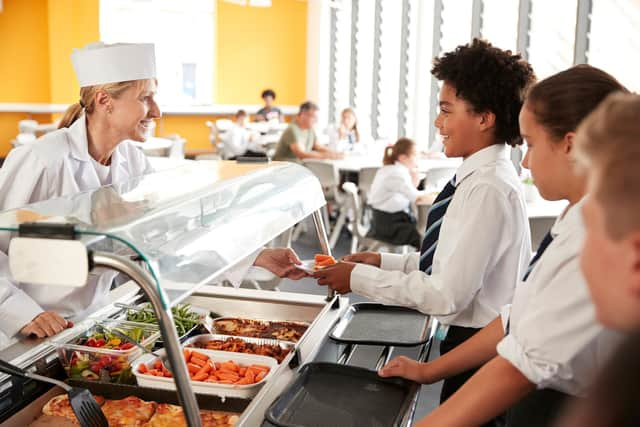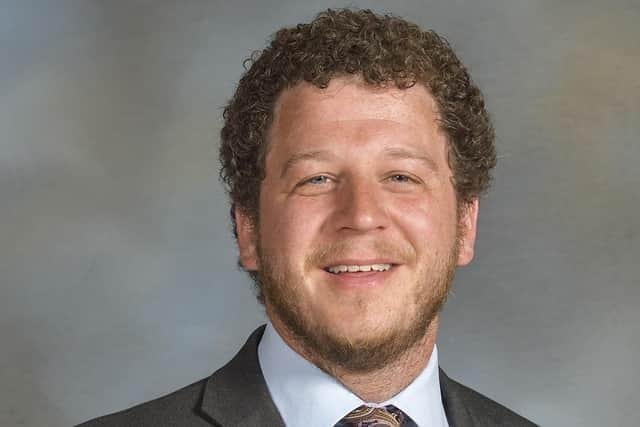'Children will suffer' says single mum and former teacher forced to put son on packed lunches as Derbyshire school meal prices set to hike
and live on Freeview channel 276
Jayne Stephenson, from Glossop, will put her son on packed lunches in September if the 41% school meal price increase announced by Derbyshire County Council will go ahead.
Jayne, who is a single mum of two, said: “A 41% jump is phenomenal, one of the highest in the country. It is a huge hike in the midst of the cost of living crisis. Schools are strapped, parents are strapped, children will suffer, and they won’t get nutritious food.
Advertisement
Hide AdAdvertisement
Hide Ad“There are studies which show that brain function is worse in the afternoon if children did not have a nutritional meal in the morning. It will affect their learning.”


But as the meal prices will go up, there are no plans so far to increase the free meal eligibility threshold – which currently is set at £7,400, which Jayne believes is a ‘horrifyingly low rate’.
She said: “You would think that as a single mum on Universal credit, I would qualify, but I am just above the threshold. I am upset that my son will have to switch to packed lunches in September, but the school meals will be too expensive for me. And it’s not just my son who will be affected – as a former teacher I’m passionate for the welfare of all pupils and I am concerned.”
But Jayne is not the only one affected by the low threshold, as the £7,400 annual income cap for free school meals means that 1.7 million children whose families are entitled to universal credit (69% of this group) are not eligible for free lunches.
Advertisement
Hide AdAdvertisement
Hide AdJayne, who used to work across different schools near Glossop believes the problem of parents not affording school meals has been ongoing for some years.


She said: “I have seen children dropping bags of crisps over the school fence for younger siblings. It’s a very difficult position for teachers and headteachers to be in because the food is not healthy, but you also know it is the only food these kids will get if parents can’t afford more nutritional alternatives.
“There has been a lot of pressure on schools to get healthy school status some time ago. But now that the catering and fresh produce prices went up, parents might not be able to afford meals at all.
“And school meals are not always healthy and I don’t think they are a good value for money. You can see it if you look at the school menus. It seems excessive to pay this much for a hot dog or a sausage roll. How can you justify £3.25 for this menu?”
Advertisement
Hide AdAdvertisement
Hide AdBut Jayne does not blame schools or parents – she thinks local councils and central government could be doing more to ensure pupils are eating healthy.


She added: “Headteachers have their heads in the hands frantically trying to find the funds for the increase. Teachers just got a pay rise which was needed because the prices of everything are going up, but with the school meals going up, it will cut a great chunk of schools’ budget.”
A study by the Institute for Fiscal Studies published earlier this year has found that since 2014, the government school meal funding has lost 16% of its value per meal in real terms. The funding rate currently stands at £2.41 per meal and if it had increased in line with inflation as measured by the Consumer Prices Index, it would now be £2.87. Increasing the funding rate to this level would cost an extra £250 million a year in current prices.
Jayne said: “The support from the central government simply isn’t enough, the free school meals should be fully subsidized after the price increase. But there aren’t plans to cover the difference between the former and the current price of the meals. It means parents or schools will have to cover the difference for the pupils who get free meals.
Advertisement
Hide AdAdvertisement
Hide Ad“In London free school meals will be free to all children from September. Derbyshire County Council and Central government should fully subsidize the free school meals, not the schools themselves. This is not acceptable.”
London Mayor Sadiq Khan recently announced that, in 2023–24, all primary-age children in state schools in London will be eligible for a free school meal, expanding eligibility by 270,000 pupils beyond the 550,000 who are already eligible.
A Department for Education spokesperson said: “To recognise the pressures facing schools, in April 2022 we announced an £18 million increase in funding for universal infant free school meals to support with costs around food, transport, and staff wages. This rate will be increasing by a further 5% in 2023/24.
“This is on top of a huge uplift in overall school funding, which next year will be at its highest level in history – per pupil, in real terms – as measured by the IFS, following the additional £2bn of investment for both 2023-24 and 2024-25 in the autumn statement.”
Advertisement
Hide AdAdvertisement
Hide AdDerbyshire County Council Cabinet Member for Education Councillor Alex Dale said: “We are acutely aware that this is a significant increase and we wish we weren’t in the position of having to make it. It is not a decision that we’ve taken lightly by any means as we know that families across Derbyshire are continuing to face real challenges with the cost of living.
"Although this year’s increase may seem like a lot in one go, this is largely due to the fact that we have started from a much lower base, at £2.30, than many other authorities. We have worked extremely hard to keep our prices down, freezing them in two out of the past four years and we are constantly striving to make the service more efficient.”
Comment Guidelines
National World encourages reader discussion on our stories. User feedback, insights and back-and-forth exchanges add a rich layer of context to reporting. Please review our Community Guidelines before commenting.